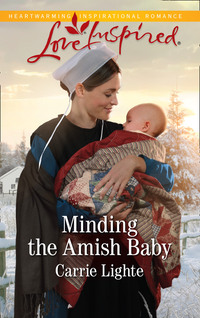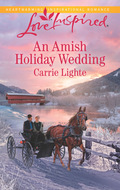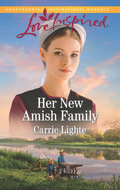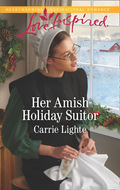Das Buch kann nicht als Datei heruntergeladen werden, kann aber in unserer App oder online auf der Website gelesen werden.
Buch lesen: "Minding The Amish Baby"
First comes baby...then comes love?
In this Amish County Courtships romance
Amish store clerk Tessa Fisher isn’t ready for marriage or a family—until a baby girl is abandoned on her doorstep. Now Tessa and her gruffly handsome landlord, Turner King, must mind the baby together. And soon Turner and the sweet-cheeked kind are burrowing into Tessa’s heart. But with secrets between them, can the temporary family find a way to stay together forever?
CARRIE LIGHTE lives in Massachusetts, where her neighbors include several Mennonite farming families. She loves traveling and first learned about Amish culture when she visited Lancaster County, Pennsylvania, as a young girl. When she isn’t writing or reading, she enjoys baking bread, playing word games and hiking, but her all-time favorite activity is bodyboarding with her loved ones when the surf’s up at Coast Guard Beach on Cape Cod.
Also by Carrie Lighte
Amish Country Courtships
Amish Triplets for Christmas
Anna’s Forgotten Fiancé
An Amish Holiday Wedding
Minding the Amish Baby
Discover more at millsandboon.co.uk.
Minding the Amish Baby
Carrie Lighte

ISBN: 978-1-474-09042-1
MINDING THE AMISH BABY
© 2018 Carrie Lighte
Published in Great Britain 2018
by Mills & Boon, an imprint of HarperCollins Publishers 1 London Bridge Street, London, SE1 9GF
All rights reserved including the right of reproduction in whole or in part in any form. This edition is published by arrangement with Harlequin Books S.A.
This is a work of fiction. Names, characters, places, locations and incidents are purely fictional and bear no relationship to any real life individuals, living or dead, or to any actual places, business establishments, locations, events or incidents. Any resemblance is entirely coincidental.
By payment of the required fees, you are granted the non-exclusive, non-transferable right and licence to download and install this e-book on your personal computer, tablet computer, smart phone or other electronic reading device only (each a “Licensed Device”) and to access, display and read the text of this e-book on-screen on your Licensed Device. Except to the extent any of these acts shall be permitted pursuant to any mandatory provision of applicable law but no further, no part of this e-book or its text or images may be reproduced, transmitted, distributed, translated, converted or adapted for use on another file format, communicated to the public, downloaded, decompiled, reverse engineered, or stored in or introduced into any information storage and retrieval system, in any form or by any means, whether electronic or mechanical, now known or hereinafter invented, without the express written permission of publisher.
® and ™ are trademarks owned and used by the trademark owner and/or its licensee. Trademarks marked with ® are registered with the United Kingdom Patent Office and/or the Office for Harmonisation in the Internal Market and in other countries.
Version: 2020-03-02
MILLS & BOON
Before you start reading, why not sign up?
Thank you for downloading this Mills & Boon book. If you want to hear about exclusive discounts, special offers and competitions, sign up to our email newsletter today!
Or simply visit
Mills & Boon emails are completely free to receive and you can unsubscribe at any time via the link in any email we send you.
“What man doesn’t want a heart-shaped cookie cutter?”
“I’m sure this will kumme in handy when I host my annual Valentine’s Day party,” Turner joked.
“Your annual Valentine’s Day party? Why haven’t I ever been invited to that?” Tessa crossed her arms, pretending to feel slighted.
“Because this is the first year I’m having it,” Turner replied without missing a beat.
Tessa giggled. “There’s something else I have to confess about my discussion with Rhoda. Because I told her you’d given me a ride to the store, she made the assumption you were courting me.”
“That’s all?” Turner asked. “Why would that offend me?”
“Because I didn’t deny it. I allowed her to think you wanted to keep our courtship a secret.”
“As long as you’re not upset about Rhoda making that assumption, then neither am I.”
“I’m not upset,” Tessa confirmed.
Why? Because it isn’t true so it doesn’t matter what Rhoda thinks, or because you’d accept me as a suitor? Turner wondered.
But even discussing a courtship between them caused warmth to course through every fiber of his being...
Dear Reader,
I confess Tessa and I share the same perspective about cooking: If I’m the only one eating, why go through the trouble of preparing a full meal? When I was much younger and single, my cupboards were just as bare as Tessa’s were, too. I’ll never forget the time my parents came to visit and my mother marveled at how spotlessly clean my oven was. Little did she know that was because I hardly ever used it. (Actually, she probably did know; mothers are clever like that.)
Also like Tessa, I make appenditlich lemon squares, if I do say so myself. I’d give you my recipe, but it’s a closely guarded secret—although it’s not nearly as big as the secret Tessa and Turner shared.
Thank you for reading their story. There are two more books to come in the Amish Country Courtships miniseries and I hope you’ll enjoy them.
Blessings,
Carrie Lighte
If we confess our sins,
he is faithful and just to forgive us our sins,
and to cleanse us from all unrighteousness.
—1 John 1:9
For everyone who loves and nurtures the children of others as if they were their own, and with special thanks to my brother.
Contents
Cover
Back Cover Text
About the Author
Booklist
Title Page
Copyright
Introduction
Dear Reader
Bible Verse
Dedication
Chapter One
Chapter Two
Chapter Three
Chapter Four
Chapter Five
Chapter Six
Chapter Seven
Chapter Eight
Chapter Nine
Chapter Ten
Epilogue
Extract
About the Publisher
Chapter One
“Soup from a can?” Tessa Fisher’s mother, Waneta, asked incredulously. “None for me, denki. I’ll just have bread and cheese.”
If her mother turned her nose up at canned soup, Tessa figured she wasn’t going to have an appetite for store-bought bread, either. She racked her brain for something else to offer her parents, who had arrived unexpectedly for Sunday dinner.
It was an off Sunday, meaning Amish families held worship services in their homes instead of gathering as a community for church. Tessa should have anticipated guests, since Sunday visiting was a cherished Amish tradition. But the truth was, as a woman living alone, Tessa was more likely to be the one dropping in on others than the one receiving visitors in the little daadi haus she rented from Turner King. Still, she hadn’t imagined her parents would travel all the way from Shady Valley, which was two towns over, to Willow Creek, Pennsylvania. Since Tessa returned from worshipping at her sister’s house only a few minutes before they arrived, she was caught unprepared.
“I’m sorry, Mamm,” Tessa apologized as she set a bagged loaf on the table. “If I had known you were coming, I would have made something ahead of time, like a dessert.”
“From a mix?” her mother half jested, untwisting the tie from the plastic bag.
When Tessa put her mind to it, she could bake and cook as well as any Amish woman, but those weren’t her favorite responsibilities and she didn’t see much point in laboring over large meals when she had only herself to feed. She’d much rather spend her time socializing or working extra shifts at Schrock’s Shop, the store in town where she was employed as a clerk selling Amish-made goods primarily to Englisch tourists. Besides, it was the Sabbath. No one prepared a big dinner on the day of rest.
“Probably,” Tessa admitted. “It’s quicker that way.”
“Since when is quicker better?” Waneta frowned. “It sounds as if the Englisch customers at Schrock’s Shop are influencing our dochder, Henry. I think it’s time she moved back home.”
Tessa’s father grunted noncommittally as he served himself several thick slices of bologna. At least the bologna was homemade, although not in Tessa’s home; she purchased it the day before at Schlabach’s meat market.
Tessa stifled a sigh. A little more than two years ago she and her sister, Katie, who were the youngest children and the only girls in their family, moved from Shady Valley so Katie could serve as a replacement for Willow Creek’s schoolteacher, who resigned to start a family. Although Katie was twenty-three at the time, Henry and Waneta were reluctant to allow her to live alone, something Amish women in their area seldom did. So, they sent Tessa, who was nearing twenty-one, to live with her. Early last November, Katie married Mason Yoder, a farmer, and moved into a small house Mason built on the Yoder family’s property. Ever since then Tessa’s mother had been pressuring Tessa to return home, which Tessa was reluctant to do. Although she loved her parents deeply, Tessa sometimes felt stifled by their overly protective attitude, and she cherished her friends and job in Willow Creek too much to leave. Yet, she also knew the Lord ultimately required her to honor her parents, no matter how old she was or how much she disagreed with their opinion.
“The customers aren’t influencing me, Mamm,” Tessa protested. “Besides, I couldn’t leave Joseph Schrock shorthanded at the shop, especially since I didn’t have any experience when I first applied for a job there. You remember? He hired me with the agreement that if he took the time and effort to train me, I’d remain a loyal employee for as long as he needed me. I can’t walk away now—you and Daed always taught us to abide by our commitments.”
Tessa knew her mother wouldn’t argue with her own instructive advice. As Henry silently chewed his bologna, Waneta slathered a slice of bread with butter and then held it up in front of her.
“The way to a man’s heart is through his stomach,” she said. “You’ll never catch a husband with food like this.”
To Tessa, it sounded as if her mother were discussing laying a trap for a wild animal. If she had known serving store-bought bread was going to result in a discussion about her likelihood of matrimony, she gladly would have baked a dozen fresh loaves to avoid the topic. Most of the area’s Amish youth were discreet about if and who they were courting, and their parents seldom interfered in their children’s romantic pursuits. But, at nearly twenty-three years old, Tessa knew her mother feared she’d never wed, and Waneta’s strongly worded hints were gaining in frequency.
“I’m in no hurry to get married,” Tessa replied. She’d had her share of suitors over the years, but in the end they didn’t seem compatible enough for her to imagine devoting herself as a wife to any of them. Nor could she imagine taking on the duty of raising a family. Not yet, anyway. Not when she’d just begun to experience the rare opportunity of being a single Amish woman living entirely on her own, without the responsibility of cooking, cleaning or taking care of anyone else in her household. She added, “There aren’t many eligible bachelors in Willow Creek, anyway.”
“Which is exactly why you ought to kumme home. I’ve been talking to Bertha Umble and her suh Melvin isn’t walking out with anyone.”
Melvin Umble? It was hardly a wonder. The last time Tessa saw him when she was visiting home, Melvin seemed far more interested in sprucing up his courting buggy than he was in an actual courtship, and he’d spoken endlessly on the topic. Tessa let her mother’s comment hang in the air.
“Would you like a cookie, Daed?” she asked. “They’re packaged, but they’re tasty.”
“How can I refuse? Apparently, it’s the way to my heart,” her father replied with a grin, and Waneta playfully swatted at him with the back of her hand.
“Henry!” she exclaimed. “I’m only trying to help our dochder.”
Deep down Tessa knew it was true that her mother was trying to help. But that was just it: Tessa didn’t need help because she was perfectly content in her present circumstances. More than content, she was happy. As far as she was concerned, she could live as a single woman indefinitely.
“Please think about what I said,” Waneta advised later as the three of them bundled into their woolen coats. They planned to spend the rest of the afternoon at Katie and Mason’s house. No doubt Tessa’s sister would serve a full supper in the evening. Although cooking a large meal wasn’t permitted on the Sabbath, Katie’s Saturday leftovers were bound to be savory and numerous.
“I always think about what you’ve said, Mamm,” Tessa replied, hoping to reassure her mother that she needn’t worry about her daughter living alone. “Nothing you and Daed taught me is ever far from my mind.”
“Nor are you ever far from our hearts and prayers,” Henry said.
“That’s very true, but I still wish she weren’t far from our home, either.” Waneta couldn’t seem to resist dropping one more hint as they stepped outside onto the small porch, but Tessa sensed it was far from her final one.
“Hallich Nei Yaahr,” Turner King greeted Tessa and her parents as he approached the daadi haus on the front corner of his property.
Although January was soon over, because they hadn’t seen him since the New Year began they wished him a happy new year, too. He extended a few colorful envelopes to Tessa. Since they technically lived at the same address, they shared a mailbox at the end of the lane. Usually, they gathered their own mail separately, leaving each other’s items behind, but these messages appeared to be belated Christmas cards and there was wet weather on the way. Turner didn’t want them to get ruined, so he delivered them on his walk back from the mailbox. “These were piling up,” he said.
Tessa’s mother clucked as her daughter accepted the mail. “She’d forget her own head sometimes,” Waneta commented. “What if one of those had been an urgent message from home, Tessa? It’s a gut thing we have Turner nearby to look after you.”
Turner noticed Tessa’s olive complexion breaking out in a rosy hue. As she stood next to her father, it was plain to see she’d inherited her prominent cheekbones and long, elegant nose from his side of the family. Turner bristled when his sister-in-law Rhoda once made the superficial remark that she wasn’t sure if she thought Tessa was the most striking woman in Willow Creek or just plain homely.
But observing Tessa and her father now, Turner understood what Rhoda meant: one couldn’t help but notice their unusual features, which differed drastically from those of most of the Amish leit in their district. For his part, Turner found their uniqueness becoming, and it was enhanced when father and daughter stood side by side. For a moment, he was distracted by how winsome she appeared. I shouldn’t be entertaining such a thought—Tessa’s closer to my little sister’s age than to mine.
“Denki for bringing these to me,” Tessa said sheepishly.
“It’s not a problem. I forgot to collect my own mail until today, too.”
“All the same, you will keep an eye on her, won’t you?” Waneta persisted, as if talking about a kind. “Especially now that she’s living alone, without Katie. We don’t want her getting into any kind of trouble.”
Tessa’s dark, deep-set eyes flashed with apparent anger before she averted her gaze. Clearly, she was as uncomfortable with this conversation as Turner was. One of the reasons he didn’t mind having renters was the Fisher girls mostly kept to themselves—at least, they did after he declined several of their invitations to supper when they first moved in. He valued his privacy and didn’t relish the idea of increasing his interactions with Tessa beyond the brief greetings they exchanged whenever their paths crossed.
“Tessa knows where to find me if she needs assistance,” he responded vaguely. Then he excused himself and hurried along the narrow lane leading up the hill to the larger house where he lived by himself.
As he walked, he marveled over the irony of Tessa’s mother asking him to keep an eye out for her daughter. If only Waneta knew Turner hadn’t been able to keep his own sister, Jacqueline, away from a world of trouble, she wouldn’t entrust Tessa to his watch.
Not that Tessa needed monitoring anyway. During the two years Tessa and Katie lived in his family’s daadi haus, the sisters always paid their rent on time and they kept the house and yard tidy. Admittedly, they often had visitors, including church members, their parents and female friends for sister days. Turner noticed Mason Yoder used to frequent the daadi haus, too, but like any suitor who called on the Fisher girls, he only stayed long enough to pick Katie up and drop her off. Aside from when they hosted a few raucous volleyball games in their yard with other single youth from church, the sisters were courteous, sensible tenants.
Granted, Turner had conversed more often with Katie than with Tessa. The younger sister’s effervescent personality frequently made him feel bumbling and dull by contrast. Rather than grow tongue-tied in Tessa’s presence, he preferred to interact with Katie regarding any issues that had arisen with the daadi haus. Now he wondered if Waneta’s comments indicated Tessa was a little too high-spirited for her own good. Maybe there was a reason unbeknownst to him behind the mother’s request. He understood how family members sometimes protected each other’s reputations; that’s exactly what he was doing for Jacqueline.
“It was difficult enough raising my own siblings. I don’t need to look after a fully grown tenant,” Turner grumbled aloud as he entered his empty house.
He tossed a couple of logs into the wood stove and then washed his hands before preparing a plate of scrambled eggs for supper. He thanked the Lord for his food, adding, Please keep Jacqueline safe from harm and bring her home soon.
Before opening his eyes, Turner rubbed his thumb and forefinger back and forth across his brows. It seemed he’d had the same unrelenting tension headache for fourteen years. It started the day his parents were killed by an automobile when he was eighteen and he was left to raise Mark, Patrick and Jacqueline, who was a toddler at the time. If his aunt Louisa, then a young widow, hadn’t been living in the daadi haus that once belonged to his grandparents, Turner never would have made it through those early years. She helped manage the children, especially Jacqueline, and he supported the family financially by taking over his father’s buggy shop. But the year Jacqueline turned ten Louisa married a mason from out of state and moved to Ohio.
With the grace of God, Turner managed to raise his brothers according to their Amish faith and traditions. But bringing up a girl—especially one who was entering her teens—was a challenge exceeding Turner’s best efforts. It wasn’t that Jacqueline was necessarily unruly; it was more that Turner suddenly was at a loss for how to communicate effectively with her. Having completed her schooling at fourteen, she was no longer considered a child, but neither was she an adult. To Turner it seemed she wanted all the privileges of adulthood without any of the responsibilities, and the brother and sister frequently locked horns. When Jacqueline turned fifteen, she moved to Louisa’s house in Ohio. By sixteen, her rumspringa began, and she suddenly left Louisa’s to live among the Englisch. Much to Turner’s consternation, it had been nearly eight or nine months since she’d contacted their family.
Raising his head, Turner released a heavy sigh. Try as he did to cast his burdens upon the Lord, lately he felt more overwhelmed than usual. He supposed this was because after his youngest brother, Patrick, married Rhoda and moved out of the house in November, Turner didn’t have anyone to distract him from his thoughts on the weekends, when he tended to worry more about Jacqueline’s welfare and sometimes took trips to search for her. It was on Saturday and Sunday evenings when he most wished for the loving support and companionship of a wife, but marriage wasn’t an option that seemed probable for him.
As a younger man, Turner’s time and energy were wholly consumed by raising and providing for his siblings. He’d expected he’d have more flexibility once they entered their teens, but in many ways Jacqueline’s disappearance limited him more now than caring for her as a child had done. How could he court anyone when his weekends were spent searching for his sister? Furthermore, he couldn’t imagine sharing the secret of Jacqueline’s circumstances with anyone outside the family. Although Jacqueline hadn’t been baptized yet so she wasn’t in the bann—or shunned—it was still considered disgraceful for her to have run away to the Englisch world.
As for marrying in the future, Turner felt he couldn’t risk starting a family of his own, for fear his wife would bear daughters. What if he failed to raise them to stay true to their Amish faith and traditions as miserably as he’d apparently failed to raise his sister? He couldn’t bear that kind of heartache again, nor could he allow his wife to suffer through it, either. No, despite his desire to marry, Turner figured the Lord must have willed for him to remain a lifelong bachelor.
Exhaling slowly, he reminded himself the next day was Monday and he’d be back in his shop with his brothers working at his side. Repairing and modifying buggies, crafting wheels and organizing inventory filled Turner with satisfaction. Unlike in the situation with his sister, there was almost no problem he couldn’t figure out and fix in his workshop.
He lifted a forkful of eggs to his mouth, but they’d already gone cold. What he wouldn’t do for a home-cooked meal—the kind his aunt used to make or his mother before that. He’d received many Sunday supper invitations, but for the past year he’d turned them down, anxious his hosts might question him about his sister. The last anyone in Willow Creek knew, Jacqueline was at Louisa’s in Ohio, and he preferred to allow them to think that was still the case. After living among the Englisch for over a year, she’d have enough explaining to do and attitudes to overcome when—or if—she returned to their community. She didn’t need rumors to begin before she’d even arrived.
Unfortunately, his isolation also meant Turner rarely enjoyed a hearty meal, unless one of his sisters-in-law made it for him. They didn’t know about Jacqueline’s disappearance, either, despite their expressed curiosity about her whereabouts. The three brothers rarely discussed Jacqueline’s absence, even with each other, but Turner knew Mark and Patrick felt as concerned about their little sister as he did and they were equally committed to guarding her against gossip, even if their wives’ questions—especially Rhoda’s—were well intentioned.
As he prepared for bed that night, Turner again reflected on his brief encounter with Tessa’s parents. If he’d been as protective as they were, might Jacqueline still be part of their family and community? Or had he been too strict? Was that what caused her to leave? There hadn’t been any significant conflict between them when she’d gone to live with Louisa. In fact, all three of them had agreed it would be beneficial to have a female influence guiding Jacqueline as she entered womanhood. Turner certainly didn’t blame Louisa for his sister’s running away, but in retrospect, he regretted allowing Jacqueline to leave Willow Creek in the first place. What if by letting her go he’d given his sister the idea she wasn’t dearly wanted, an integral member of their family? Turner shuddered. Once again, he asked the Lord to keep her safe and warm, to guard her against sinful temptation and to bring her home soon.
The pain that had been plaguing Turner all day moved from his forehead down the side of his jaw and into his neck. As his head sunk into the pillow, he decided no amount of distress was worth such physical discomfort. He had to stop worrying, keep praying and start working harder at finding his sister. Meanwhile, he wasn’t going to be his tenant’s keeper, no matter how insistent her mother was.
When the new day dawned, Tessa practically leaped out of bed. She loved Monday mornings, when she returned to her job at Schrock’s. Initially, because her parents sheltered her so closely, she had little experience interacting with the Englisch, and she barely spoke a word to the tourists. But after two years as a clerk, she’d grown accustomed to the Englischers’ ways and she readily struck up conversations as she assisted them with their purchases. Although she missed her close friend, Anna Chupp, who quit clerking when she got married, Tessa enjoyed engaging with the Schrock family and other Amish leit who consigned their goods in the shop.
“Guder mariye,” she greeted Joseph when she entered through the back door.
“Guder mariye, Tessa,” he said, pushing his glasses up the bridge of his nose. “Before you go into the gallery, I’d like to have a word with you.”
“Of course. What can I do to help?”
Joseph smiled wanly. “Your willingness to be of assistance makes it very difficult for me to tell you this, Tessa. But you know our holiday sales weren’t what I hoped they’d be this year. Now that Grischtdaag has passed and Englisch schools are back in session, there will be fewer tourists passing through Willow Creek until the weather warms. I’m afraid I temporarily have to reduce your hours.”
Tessa’s stomach dropped. “By how much?”
“I can only schedule you to clerk on Saturdays,” Joseph confessed, shaking his head. “If I had my druthers, I’d keep you on full time and release one of the other employees, but of course I can’t do that.”
No, because that would mean releasing Melinda Schrock, the clerk who recently wed Joseph’s nephew, Jesse. Tessa understood family came first.
“I see,” she said plaintively.
“It’s only for a season. When spring rolls around, I’ll have you back to full time again.”
There was only one problem with Joseph’s plan: without a steady income, Tessa wouldn’t be able to pay her rent. She’d have to move back home before spring ever “rolled around.” And once she did that, there’d be no escaping her mother’s matchmaking attempts—not unless she got married, anyway.
Some escape that would be, she thought later as she fidgeted in bed long past midnight, mentally calculating her savings and racking her brain for another temporary employment opportunity, some job she could give up at a moment’s notice in order to return to the shop. In the end, the only solution she could devise was asking Turner if she could postpone making her rent payments until her work schedule picked up again—something she was hesitant to do. Turner had already been more than generous in allowing her and her sister to live there, renting the daadi haus at a fraction of what he could have required. He even reduced Tessa’s rent when Katie moved out. Although she’d be asking for only an extension, not a reduction, of her payments, she didn’t want to take advantage of his benevolence. Nor did she want him to think she was irresponsible; her mother’s recent comments to him on that subject had been humiliating enough.
More than that, Tessa was reluctant to speak with Turner because she harbored a sense of self-consciousness in his presence. When she and Katie moved in, Tessa had developed a full-fledged crush on Turner, who was sinewy and tall and whose tempestuous blue eyes and reticent nature gave him an air of mystery. That he’d been so well respected in the community and so charitable about their rent made her like him all the more. As a result, she tended to become highly animated whenever she spoke to him, sometimes making frivolous remarks because she was nervous in his presence. But he never accepted the sisters’ invitations to share Sunday supper with them and their friends at the daadi haus, and Tessa suspected he was put off by her obvious interest in him. Eventually, she conceded Turner was too unsociable for her liking anyway and she gave up trying to get to know him better.
Indeed, over time she observed how often he wore a scowl across his face. While Turner wasn’t quite ten years older than Tessa, she thought his countenance aged him. It apparently kept people at a distance, too, including his own sister. It was rumored Jacqueline had gone to live with her aunt the year Katie and Tessa moved into the daadi haus, and the girl hadn’t paid her brother a visit since then. Tessa wasn’t altogether surprised. Although Mark and Patrick King were generally congenial, she couldn’t recall the last time she’d seen Turner smile. She imagined his somber demeanor would have felt oppressive to his teenage sister, especially since Jacqueline was said to be naturally humorous and outgoing.
In any case, unless the Lord directed her toward another solution, Tessa resigned herself to asking Turner for an extension on her rental payments. Scooting out of bed, she put a prayer kapp on over her loosely gathered hair and prayed a simple prayer: Lord, I don’t know what else to do and I really want to stay in Willow Creek. Please reveal Your will for me in this situation. Amen.
Die kostenlose Leseprobe ist beendet.





